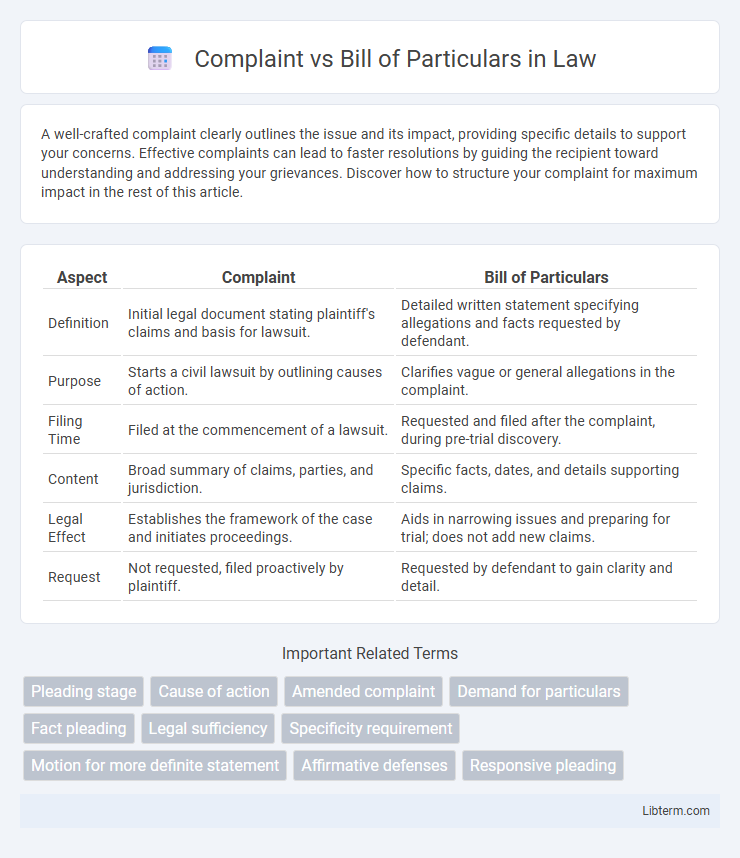A well-crafted complaint clearly outlines the issue and its impact, providing specific details to support your concerns. Effective complaints can lead to faster resolutions by guiding the recipient toward understanding and addressing your grievances. Discover how to structure your complaint for maximum impact in the rest of this article.
Table of Comparison
| Aspect | Complaint | Bill of Particulars |
|---|---|---|
| Definition | Initial legal document stating plaintiff's claims and basis for lawsuit. | Detailed written statement specifying allegations and facts requested by defendant. |
| Purpose | Starts a civil lawsuit by outlining causes of action. | Clarifies vague or general allegations in the complaint. |
| Filing Time | Filed at the commencement of a lawsuit. | Requested and filed after the complaint, during pre-trial discovery. |
| Content | Broad summary of claims, parties, and jurisdiction. | Specific facts, dates, and details supporting claims. |
| Legal Effect | Establishes the framework of the case and initiates proceedings. | Aids in narrowing issues and preparing for trial; does not add new claims. |
| Request | Not requested, filed proactively by plaintiff. | Requested by defendant to gain clarity and detail. |
Introduction to Complaint and Bill of Particulars
A Complaint is the initial legal document filed by a plaintiff to formally state the claims and allegations against a defendant, outlining the basis of the lawsuit. A Bill of Particulars is a detailed, specific statement provided by the defendant or plaintiff upon request, clarifying the particulars of the claims or defenses in the Complaint. Understanding the distinction ensures proper case preparation and adherence to procedural requirements in civil litigation.
Defining a Legal Complaint
A legal complaint is a formal document filed by a plaintiff initiating a lawsuit, outlining the facts and legal claims against the defendant. It serves as the foundational pleading that sets the stage for the entire litigation process by specifying the grievances and the relief sought. In contrast, a bill of particulars is a detailed, supplementary statement ordered by the court to clarify and elaborate on the allegations stated in the complaint.
What is a Bill of Particulars?
A Bill of Particulars is a detailed, formal document requested by a party in a lawsuit to obtain specific information about the claims or defenses outlined in a Complaint. It aims to clarify vague or general allegations by requiring the opposing party to provide precise details, including dates, events, and factual bases underlying the claims. This document enhances fairness in litigation by ensuring both parties understand the exact issues in controversy before trial.
Key Differences Between Complaint and Bill of Particulars
A Complaint initiates a lawsuit by outlining the plaintiff's allegations and legal claims against the defendant, serving as the foundational document in civil litigation. A Bill of Particulars provides a detailed, specific clarification of the claims or defenses stated in the Complaint, allowing the opposing party to understand the precise issues in dispute. The key difference lies in their functions: the Complaint sets forth the general grounds for the lawsuit, while the Bill of Particulars refines those claims to avoid ambiguity and prepare for trial.
Purpose of Filing a Complaint
The purpose of filing a complaint is to formally initiate a lawsuit by outlining the plaintiff's allegations and legal claims against the defendant. It sets forth the essential facts and causes of action that establish the basis for the court's jurisdiction and the relief sought. A complaint serves as the foundation for litigation and triggers the defendant's obligation to respond.
Purpose of Requesting a Bill of Particulars
A Bill of Particulars is requested to obtain detailed, specific information about allegations stated in a Complaint, ensuring clarity and precision in the legal claims. It serves to narrow down vague or general charges, enabling the defendant to prepare an effective defense by understanding the exact nature of the claims. This procedural tool prevents surprise at trial and promotes fair notice by detailing facts, dates, and circumstances underlying the Complaint.
Procedural Steps for Complaints
Filing a complaint initiates a lawsuit by stating the plaintiff's claims and grounds for relief with sufficient factual detail to notify the defendant. The procedural steps for complaints include drafting the complaint, filing it with the court, and properly serving the defendant with the summons and complaint within the statutory deadline. Following the complaint, the defendant may respond by filing an answer or motion to dismiss before the discovery process begins.
How to Request and Respond to a Bill of Particulars
To request a Bill of Particulars, a party must file a formal written demand specifying the particular details needed to clarify the claims or defenses outlined in the complaint, typically within a court-prescribed deadline. The respondent is required to provide a detailed written response outlining the requested specifics, which must be submitted within the timeframe set by procedural rules to avoid dismissal or adverse inferences. Courts enforce strict compliance with Bill of Particulars deadlines to ensure clarity in pleadings and facilitate efficient case management.
Legal Implications of Each Document
A Complaint initiates a lawsuit by outlining the plaintiff's claims and legal grounds, setting the stage for judicial review and potential relief. A Bill of Particulars provides detailed clarifications of the allegations or defenses in the Complaint, playing a crucial role in defining the scope of discovery and trial preparation. Misinterpretation or delay in either document can result in procedural dismissals, sanctions, or an adverse impact on case strategy and legal outcomes.
Importance in Civil Litigation
A Complaint initiates a civil lawsuit by outlining the plaintiff's claims and legal grounds, establishing the basis for the case. A Bill of Particulars provides detailed information about the claims or defenses, ensuring clarity and fairness by specifying facts and particulars the opposing party must address. Both documents are crucial for structuring the litigation process, facilitating discovery, and preventing surprises during trial.
Complaint Infographic

 libterm.com
libterm.com